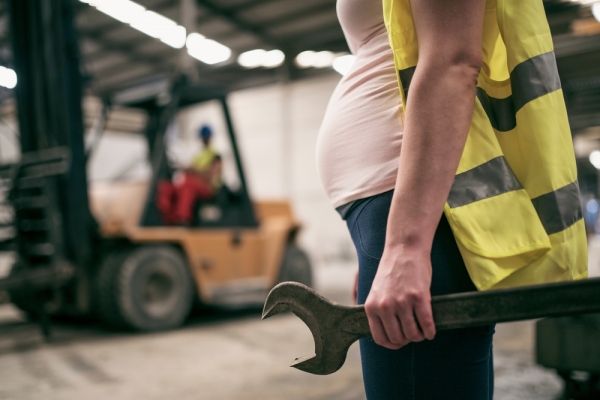In an increasingly polarized Congress, protections for pregnant workers via the Pregnant Workers Fairness Act may be an avenue for bipartisanship between conservative and progressive lawmakers and activists — especially for Christians.
“That’s the sort of thing that catches the attention of both those who are operating in worker justice, for women in particular … but also those who are concerned with the unborn,” said Clayton Sinyai, executive director of the Catholic Labor Network. “This [bill] is pro-worker, pro-family, and pro-life, and all of those are concerns for Catholics.”
All but five states — Alabama, Indiana, Nevada, North Carolina, and South Dakota — offer state-level protections against discrimination in the workplace, but there’s no federal statute that expands on the basic protections afforded by the Pregnancy Discrimination Act of 1978 which “forbids discrimination based on pregnancy when it comes to any aspect of employment.”
The Pregnant Workers Fairness Act, introduced in the House by Rep. Jerry Nadler (D-N.Y.), passed Congress’s lower body last May with the approval of all House Democrats and nearly half of House Republicans. The bill now faces a vote on the Senate floor where it was co-sponsored by Sen. Bob Casey (D-Pa.) and Sen. Bill Cassidy (R-La.).
The bill has been praised by faith groups, human rights organizations, and legal firms. In August, after the Senate Committee on Health, Education, Labor and Pensions passed the bill 19-2, underscoring its bipartisanship, the U.S. Conference of Catholic Bishops penned a letter declaring their support.
“Catholic teaching is clear that policy choices around work should be made to support the family because ‘family life and work mutually affect one another,’” the letter reads. “We stand ready to work with Congress to strengthen legal protections for pregnant workers and nursing mothers.”
Despite support from 99 House Republicans, some conservative lawmakers on the Committee on Education and Labor lamented that the House bill does not include protections for “religious freedom” and would force some religious organizations to “make hiring decisions that conflict with their faith.”
But Rachel Anderson, who leads the Families Valued project at the Center for Public Justice, said that the Pregnant Workers Fairness Act will not infringe upon religious freedoms for faith-based employers because those freedoms are already protected under federal law.
Anderson also noted that the bill would offer critical protections to low wage workers by expanding protections currently offered under the Pregnancy Discrimination Act of 1978 and clarifying the process of accessing reasonable workplace accommodations. Often, accommodations for pregnant workers are simple: exemptions from heavy lifting for a few weeks, a stool to sit on, or access to drinking water during the day.
“Many of the documented experiences of pregnancy discrimination or refusal of reasonable accommodation occur in lower wage jobs, women in the food production industry, women who are working in warehouses, like Amazon fulfillment centers,” Anderson said. “That can very much be disproportionately a burden on women of color.” An important consideration, she said, given the disproportionately high infant and maternal mortality rates among Black people.
Over 50,000 pregnancy discrimination claims have been filed with the Equal Employment Opportunity Commission and Fair Employment Practices Agencies over the last decade, according to a Baylor University study released last year.
Under current federal legislation, pregnant workers who have faced discrimination must prove in court that they were denied accommodations granted to other employees in a “similar condition,” according to policy experts interviewed for this article. They say this has been one of the major challenges in winning pregnancy discrimination cases.
“Part of what can unite people who look at this from a women's rights perspective and those who look at it from pro-life and pro-family perspective — which can be all consistent with one another — is a recognition that pregnancy is a normal part of the human condition, and should be protected on its own terms,” Anderson said.
Emily Martin, the vice president of education and workplace justice at the National Women’s Law Center, has been involved in drafting the bill since it was initially conceived nearly 10 years ago. She said it's taken time for it to get the support it has today; a major turning point was when the U.S. Chamber of Commerce endorsed the legislation in its current iteration.
Martin is “optimistic” that the PWFA will pass the Senate based on its bipartisan House support and similar state legislation, but worries its path to the Senate floor might be delayed by all of the current emergency legislation. Martin says the pandemic has made it all the more imperative to pass the bill as soon as possible.
“In the context of COVID-19, we’ve seen such terrible pressures on women as caregivers over the past year, in particular mothers have been called upon to do so many things at once,” Martin said. “So many [women] have left the workforce entirely as our caregiving infrastructure has broken down.”
“The Pregnant Workers Fairness Act is a little piece of the solution of ensuring that our workplaces are designed so that having children doesn’t mean a huge economic sacrifice or huge setback in your career. It’s not the only thing we need, but it’s part of the solution.”
Michael Wear, who served in the White House faith-based initiative during Barack Obama’s first term, said educating employers and workers on worker's rights is just as important as passing the bill.
“It’s one thing to have this [legislation] on the books, it’s another thing for the low-wage worker to feel empowered and feel like the government has their backs if they assert their rights,” Wear said. “That will be an important commitment I want to see out of the Biden administration — and others — is to make this meaningful in practice.”
This commitment requires a multifaceted approach, Wear said: It will need support from the Department of Labor, vigilance from the Equal Employment Opportunity Commission in processing pregnancy discrimination cases, and commitment from workers’ unions to ensure implementation in the workplace.
“When you’re talking about families and when you’re talking about babies, it’s a whole-of-society effort and commitment,” Wear said. “And that’s the kind of culture we should be building.”
The bill has been placed on the Senate calendar, but has yet to be scheduled for a floor hearing.
Got something to say about what you're reading? We value your feedback!






